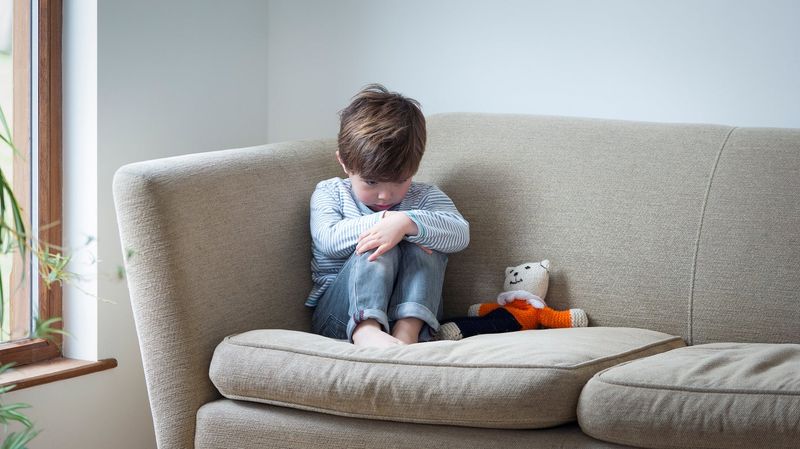16 Subtle Signs You’re Putting Too Much Pressure on Your Kid
Every parent wants their child to succeed. But sometimes, without meaning to, support turns into pressure—and pressure turns into stress.
Kids don’t come with warning lights that flash when we’re expecting too much, and the line between healthy encouragement and harmful pressure can be surprisingly thin.
The consequences? Children who feel they’re never quite good enough, who measure their worth by their achievements, and who miss out on the joy of just being kids.
As someone who’s both been that pressured child and watched friends navigate parenting struggles, I’ve seen how these patterns develop so gradually that they’re easy to miss.
Here are 16 subtle signs you might be putting too much pressure on your child, and why noticing it matters more than ever.
1. Fear of Making Mistakes Becomes Paralyzing

Your child erases their homework repeatedly until the paper tears. They cry over a slightly crooked line in their drawing. When perfection feels like the only option, kids start seeing mistakes as personal failures, not learning moments.
This perfectionism isn’t innate—it develops when children sense that errors lead to disappointment rather than guidance. Watch for signs like refusing to try activities they’re not immediately good at, or having meltdowns over minor imperfections.
Remember when learning to walk, babies fall hundreds of times without giving up. That natural resilience gets squashed when we react to mistakes with frustration or excessive correction.
Instead, share stories about your own mistakes and what you learned. Celebrate the attempt, not just the outcome. Your child needs to know they’re valued for their courage to try, not just their ability to succeed.
2. Achievements Are Never Celebrated

“It’s just an A-minus” or “I could have scored higher” becomes their mantra. When your child brings home a great report card but immediately points out the one B, or wins second place but focuses only on not getting first, they’re showing classic signs of never feeling good enough.
This tendency to downplay successes isn’t modesty—it’s a defensive mechanism. Kids who can’t celebrate achievements are often protecting themselves from potential disappointment or criticism. They’ve internalized the message that only perfection deserves acknowledgment.
Look at how you respond to their accomplishments. Do you immediately ask about the parts that could be improved? Do you compare their achievements to others or their previous performances?
Try creating a ritual where everyone shares something they’re proud of at dinner, with no qualifiers allowed. Help them recognize that progress, effort, and personal bests deserve genuine celebration.
3. Stomach Aches Before Tests or Performances

Those mysterious Sunday night stomach aches aren’t just coincidence. Physical symptoms of anxiety—headaches, nausea, sleep problems—often spike before school, tests, or performances when kids feel overwhelming pressure to succeed.
Your child’s body is literally telling you something their words might not. These physical reactions happen when the stress response goes into overdrive, flooding their system with cortisol. Pay attention when these patterns emerge, especially if they coincide with academic or extracurricular expectations.
Ask gentle questions about what worries them about tomorrow’s test or game. The answer might surprise you—often it’s not the activity itself but fear of disappointing you or others. Create a pre-event ritual focused on self-care rather than last-minute preparation.
A calm walk, a favorite meal, early bedtime with a loved stuffed animal—these signal that their wellbeing matters more than their performance.
4. Avoiding New Challenges Unless Success Is Guaranteed

“I don’t want to try out for the team” or “I’m not taking that advanced class” might sound like lack of interest. Look closer—it could be fear of failure. Kids under pressure often avoid anything where success isn’t guaranteed.
This risk avoidance stems from equating mistakes with personal inadequacy. When children believe their worth depends on constant achievement, the potential embarrassment of public failure becomes terrifying. Notice if your child only pursues activities where they’re already skilled or if they abandon interests after the first setback.
Create a family culture that celebrates brave attempts, not just victories. Share stories of famous failures-before-success. Start a “First Attempt In Learning” jar where everyone writes down something new they tried, regardless of outcome.
Most importantly, model this yourself—let them see you try something new and struggle. Your willingness to be imperfect gives them permission to grow through discomfort.
5. The Constant Approval Check

Your child scores a goal and immediately looks to the sidelines for your reaction. They finish a drawing and rush to show you before they’ve even decided if they like it themselves. This constant need for external validation reveals a troubling pattern.
When kids can’t enjoy achievements without parental approval, they’re showing signs of having outsourced their self-worth. Their internal voice asking “Am I good enough?” has been replaced with “Do they think I’m good enough?” This subtle shift means they’re no longer developing their own standards or opinions about their work.
Start asking “How do YOU feel about it?” before giving your assessment. Wait before offering praise or criticism—let them sit with their own feelings first. Encourage them to keep certain projects private until they’ve decided what they think.
These small changes help them develop that crucial internal barometer of success that will serve them long after you’re no longer on the sidelines.
6. Self-Criticism That Never Quits

“I’m so stupid” or “I never do anything right” becomes their reflexive response to even minor setbacks. When your child’s internal dialogue sounds like a harsh critic rather than a supportive friend, they’re showing signs of internalized pressure.
This negative self-talk doesn’t develop in a vacuum. Kids pick up these patterns from somewhere—often from hearing adults criticize themselves or from receiving frequent corrections with little positive reinforcement. The danger is that this voice becomes so familiar they stop questioning its accuracy.
Help them challenge these thoughts by asking, “Would you talk to your friend that way?” or “Is that completely true?” Create a household rule against negative self-talk for everyone, not just the kids.
When you hear it, gently interrupt with “That’s not how we talk about people we love, including ourselves.” Remember that your child’s inner voice often mimics what they hear from you—about yourself and about them.
7. Secret-Keeping to Avoid Disappointment

The test that gets hidden in the backpack. The invitation not mentioned until the last minute. When children start concealing normal parts of their lives, they’re often protecting themselves from anticipated disappointment or criticism.
This pattern of omission reveals they’ve learned that honesty carries risks. Maybe they’ve seen your face fall when they mentioned struggling in math, or noticed how quickly a casual conversation turned into a strategy session for improvement. Kids are incredibly perceptive about our emotional responses, even when we think we’re hiding them.
Create safety around truth-telling by responding calmly to disappointing news. Practice phrases like “Thanks for telling me” and “Let’s figure this out together” rather than immediate problem-solving or expressions of disappointment.
Share age-appropriate stories about times you struggled and needed help. When honesty feels safer than hiding, kids can bring their whole selves to you—struggles, mistakes, and all.
8. Downtime Feels Like Wasted Time

Your child can’t relax without feeling guilty. Free time gets filled with extra practice or studying “just to get ahead.” They seem uncomfortable with unstructured time, constantly asking if they should be doing something productive instead of just playing.
This inability to rest without guilt doesn’t happen naturally. It develops when children absorb the message that their value comes from productivity rather than simply existing. Notice if your child seems anxious during vacations or weekends without plans, or if they justify leisure by framing it as somehow productive.
Deliberately model healthy downtime. Let them see you enjoying a book “just because” or taking a nap without apology. Schedule actual nothing-time on the family calendar and treat it as importantly as other appointments. Talk about the biological necessity of rest for growing bodies and brains.
Most importantly, resist the urge to praise them for being “always busy” or “so productive”—these well-intentioned compliments can cement the belief that their worth depends on constant activity.
9. Achievements Define Their Identity

“I’m the smart one” or “I’m the soccer player” becomes their entire self-concept. When children define themselves exclusively through accomplishments, they’re showing signs of confusing what they do with who they are.
This identity fusion is particularly dangerous because it makes normal failures feel like existential threats. A bad game isn’t just a bad game—it makes them question their entire worth. Watch for signs they struggle to talk about themselves without mentioning grades, sports, or other achievements.
Deliberately notice and comment on character qualities unrelated to performance: their kindness, curiosity, sense of humor, or compassion. Ask questions about their thoughts and feelings rather than just their accomplishments.
Create family activities where the goal is fun or connection, not skill-building or winning. Help them understand that who they are is constant and valuable, while what they do is just one expression of that deeper self—not its definition.
10. Feeling Like a Burden When Needing Help

“I’m sorry for bothering you” or “I’ll figure it out myself” becomes their response when facing normal childhood struggles. When kids apologize for needing support or hesitate to ask for help, they’re showing they feel their problems inconvenience you.
This reluctance often develops when children sense that their struggles create stress for parents. Maybe they’ve noticed your frustration during homework help, or picked up on tension when they need extra attention. The unintended message they receive is that being “easy” is how they maintain your approval.
Make asking for help normal by doing it yourself—out loud and without shame. Request their assistance with age-appropriate tasks and thank them genuinely. Create regular check-in times where questions and problems are invited, not just tolerated.
Respond to their requests with genuine presence rather than rushed solutions. The goal is helping them understand that interdependence is healthy, and that needing support is part of being human—not a failure of independence.
11. Apologizing for Normal Kid Behavior

“Sorry I laughed too loud” or “Sorry I got excited” comes out of their mouth regularly. When children apologize for normal emotions or developmental behaviors, they’re revealing they don’t feel accepted as they are.
This over-apologizing becomes a protective mechanism—a way to preemptively manage adult disappointment. It suggests they’re walking on eggshells, constantly monitoring themselves against an impossible standard of perfection. Listen for apologies that seem unnecessary or excessive for the situation.
Gently point out when apologies aren’t needed: “You don’t need to say sorry for being excited” or “Making mistakes while learning isn’t something to apologize for.” Help them distinguish between genuine apologies (for hurting someone) and unnecessary ones (for normal development or emotions).
Create a family challenge to replace unnecessary “sorry” statements with alternative phrases like “thank you for your patience” or simply stating needs directly. Your consistent message should be that being fully human—with all its messiness—is exactly what you expect and love.
12. Conversations About Progress Feel Threatening

Report card day brings tears. Parent-teacher conferences cause anxiety for days before. When normal check-ins about progress trigger disproportionate fear, your child is showing they associate performance discussions with shame rather than support.
This reaction develops when conversations about grades, sports, or activities consistently focus on shortcomings rather than process. Children learn to dread these discussions because they’ve become evaluations of their worth rather than opportunities for growth. Notice if your child changes the subject, becomes defensive, or shows physical signs of anxiety when progress comes up.
Transform these conversations by changing your opening questions. Instead of “How did you do on the test?” try “What did you learn while studying that you found interesting?” or “What felt challenging about that project?”
Create regular low-stakes check-ins so that talking about progress becomes normalized, not reserved for high-pressure moments. Above all, separate discussions of performance from expressions of love and acceptance—make it clear these conversations are about the work, not about their value.
13. Confidence Crumbles Despite Success

“I just got lucky” or “Anyone could have done it” becomes their explanation for clear achievements. When children consistently discount their successes or attribute them to external factors, they’re revealing a fragile self-image that persists regardless of evidence.
This pattern of low self-esteem despite objectively good performance suggests they’ve internalized impossibly high standards. Success feels temporary and fragile—a lucky break rather than the result of their efforts or abilities. They may even worry that each achievement raises expectations for next time, creating a never-ending treadmill of proving themselves.
Help them connect their efforts to outcomes through specific observations: “I noticed you studied every day for that test” rather than general praise like “You’re so smart.” Encourage them to keep a success journal where they record achievements and the specific actions that led to them.
Most importantly, create opportunities for them to experience intrinsic satisfaction from mastery—projects or activities done for the joy of doing them well, not for external validation or rewards.
14. Relief Instead of Joy After Succeeding

The championship game ends with a win, but instead of celebration, your child just looks relieved it’s over. When success brings exhaustion rather than excitement, they’re showing signs of performing to avoid negative outcomes rather than for positive ones.
This relief response reveals they view achievement as escaping disappointment rather than earning joy. It’s the emotional equivalent of constantly playing defense, never offense. Watch for body language after successes—slumped shoulders, sighs of relief, or statements like “At least that’s over” instead of genuine happiness.
Create post-achievement rituals that focus on enjoyment rather than evaluation. Ask “What part did you enjoy most?” before “How do you think you did?”
Give them permission to feel multiple emotions about achievements, including relief but also pride, excitement, or even disappointment if it wasn’t what they expected. Share your own complex feelings about accomplishments. The goal is helping them understand that achievements are experiences to be fully felt, not just hurdles to clear.
15. Abandoning True Interests for “Impressive” Ones

The art supplies gather dust while SAT prep books take over. The recreational soccer team gets dropped for the competitive one, despite your child’s preference. When children abandon activities they love for ones that look better on applications or earn more recognition, they’re sacrificing authenticity for approval.
This pattern reveals they’ve absorbed the message that some passions are more valuable than others—usually those with external validation, competitive elements, or resume-building potential. Notice if they seem more enthusiastic about the idea of an activity than the actual experience, or if they light up during certain activities but push themselves toward others.
Ask open-ended questions about what they enjoy most about various activities, listening without judgment for where their genuine enthusiasm lies. Share stories about people who followed unconventional passions.
Create space in their schedule for at least one activity done purely for joy, with no performance metrics attached. Remember that childhood is not just preparation for adulthood—it’s its own precious time deserving of authentic experience.
16. Physical Signs of Chronic Stress

Headaches become regular visitors. Sleep problems turn into a pattern. When your child shows persistent physical symptoms without clear medical causes, their body might be expressing what they can’t verbalize—that expectations feel overwhelming.
These stress responses aren’t conscious attempts to avoid responsibility; they’re genuine physiological reactions to emotional pressure. The developing nervous system responds to perceived threats—including fear of disappointment or failure—by triggering real physical symptoms. Pay attention to patterns of when these symptoms appear and what might be triggering them.
Create consistent routines that include adequate sleep, physical activity, and downtime. Teach simple stress management techniques like deep breathing or progressive muscle relaxation. Consider whether their schedule allows enough transition time between activities or if they’re constantly rushing from one demand to another.
Most importantly, be willing to make difficult decisions about reducing commitments if necessary. A childhood filled with achievement but undermined by chronic stress creates an adult who associates success with suffering.







